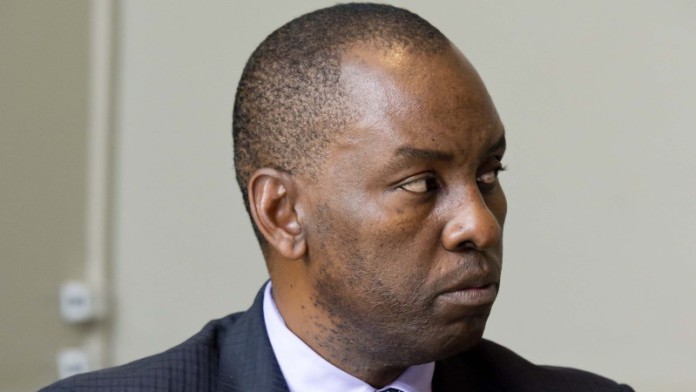
THE word from South Africa’s mines minister, Mosebenzi Zwane, is that discussions with the Chamber of Mines over a new mining charter have been fruitful.
The net result is a positive outcome in which the chamber has agreed to certain government needs for more profound black economic empowerment, whilst the South African government has made important concessions too.
But was this the way it was supposed to be when the first charter was signed in 2003? And is the South African mining industry set upon a new course of uncertainty?
IT shouldn’t come as a surprise that the Department of Mineral Resources (DMR) shunned the mining industry when it gazetted a draft new mining charter early in the second quarter of this year.
In August last year, the DMR’s deputy director-general, Mosa Mabuza, warned parliament that the government did not need to consult before releasing new policies. “It’s our job to regulate. That’s what we do,” Mabuza said. “There’s an impression that we need the permission of certain groupings to do our job. That’s incorrect.”
Fast-forward eight months and the DMR published a new concept charter in the Government Gazette on a Friday afternoon that required all mining right holders to be restructured around special purpose vehicles holding a 26% ownership stake among black entrepreneurs, workers and communities.
The DMR essentially drew a line through the ‘once-empowered, always-empowered’ question and insisted the industry re-empower itself perpetually.
In addition, the DMR hardened procurement objectives, demanding among other things that a mining right holder buys a minimum of 60% of locally manufactured capital goods from companies that are compliant with black-economic empowerment (BEE) obligations.
In addition, 30% of the 60% must be given to small business development which are BEE-compliant, while a minimum of 10% of the 30% must be reserved for BEE-compliant enterprise development.
Employment targets were also upped: a minimum of 60% of black employees should be appointed in senior management positions of which 30% should be black women. At middle management level, a minimum of 75% of the staff component should be black employees, while 38% of that portion should be black women. A minimum of 88% of employees in junior management should be black of which 44% should be black females.
Industry players, lawyers and commentators complained that government “blindsided” the extractive industry by releasing the charter without the industry’s input.
“The intention seems to be to use the draft Mining Charter to facilitate the consultation with stakeholders,” Canadian legal firm Fasken Martineau said in a company note. “This approach gives the government a strategic advantage over other stakeholders.”
But Jacinto Rocha, a former DMR employee, who was involved in the draft of the very first mining charter in the early 2000s, said procedurally government didn’t err in releasing the charter before the industry had sight of it.
“They did nothing wrong. The department probably meant for engagements to take place within the public sphere. They would have been in the wrong if they had brought out a draft and promulgated it without public comment. Yes, it would have been nice to engage and consulted, but there’s nothing wrong with what they’ve done.”
Peter Leon, mining lawyer at Herbert Smith Freehills, however, said that the unexpected publication of the draft charter was the “latest in a long series of charter-related blindsides” that have gradually damaged the relationship between government and the mining industry.
“The first was 14 years ago, when a leaked draft of the first mining charter demanded that mines become more than 50% black-owned within 10 years,” said Leon in an article in Business Day.
After the first leak the industry and government held extensive talks to come up with a more achievable charter, which was promulgated in 2004 under section 100 of the Mineral and Petroleum Resources Development Act (MPRDA).
Bernard Swanepoel, chairman of the Joburg Indaba, a conference, and one of the mining CEOs involved in the initial charter negotiations, recalled that the first process was all but transparent.
“There were several rounds of negotiations. Remember, we were in an environment where mining companies thought they were the owners of the country’s mineral wealth and they viewed the fact that they had transferred this right to the state as a major concession.
“The issues during the first process were as contentious – and there was a nationalisation debate in the background. Government’s initial target of 51% wasn’t attainable, and the industry realised a figure below 10% wasn’t going to work either,” said Swanepoel.
“Our first goal was 15% empowerment and the second was 26%. The first 15% was a painful and difficult process and the 26% was a distant aspiration, but as an industry we achieved it.”
Swanepoel believes the Chamber of Mines managed to demonstrate that most of its members reached the 26%-empowerment target, based on the once-empowered, always-empowered principle.
YOU WERE ONCE EMPOWERED
Industry sources are of the view that past empowerment transactions were done in good faith and delivered real black economic empowerment in one form or another. But the once-empowered, always-empowered-principle has been a major sticking point since 2010 when the second mining charter was gazetted.
Manus Booysen, mining lawyer at Webber Wentzel, is of the view that the original charter of 2004 specifically provided for the value of previous deals to be taken into account. But with the second charter the perceived gentleman’s agreement seemed to have dissipated.
“The concept of once-empowered, always-empowered was raised in the second Mining Charter (of 2010), and the parties agreed to disagree,” said Mark Cutifani, CEO of Anglo American. “The minister (Susan Shabangu) made reference to the fact that certain transactions didn’t deliver real transformation and our position was that she should then challenge those transactions.”
But not everybody agrees.
As one of the original drafters of the Charter and the MPRDA, Rocha holds the view that there is no provision for once-empowered, always-empowered in legislation.
“The MPRDA is the principle legislation and the Mining Charter exists because of the MRPDA. So the question you need to start with is: Does the MPRDA make provision for once-empowered, always-empowered? The answer is no.”
Rocha does, however, concede that the language in the first charter was unclear. “I can understand why they (mining companies) raise the ownership issue. There’s the matter of ‘continuing consequences’ that people interpret as once-empowered, always-empowered.
You now have a badly drafted, inconsistently applied crock of rubbish
But continuing consequences – a principle that enables companies to claim points for BEE – were only applicable to the units of production,” said Rocha.
In the context of the mining charter it is applicable to transactions that relate to the disposal of assets.
“Unfortunately people are trying to say it also applies to shares. However confusing the concept may be – there is no way the charter says continuing consequences also apply to the disposal of shares. There is a distinction,” said Rocha.
While Rocha is in agreement with government about the ownership issue, the mining industry and those who represent their interests are of a different view. To this end the Chamber of Mines and then mines minister, Ngoako Ramatlhodi, decided to approach the courts to obtain a declaratory order on once-empowered, always-empowered.
Matthew van der Want from Van der Want Attorneys said the publication of the new draft charter in which the DMR “lays down the law” on the ownership issue came as a direct response to Chamber of Mines’ court application and lawyer Hulme Scholes’ bid to have the 2004 and 2010 Mining Charters declared unconstitutional.
“Government’s move should be viewed as an opening gambit and was published as a direct response to the chamber and Hulme Scholes’ court cases,” he said.
In August last year, Scholes and his firm launched a court application to set aside the Mining Charters of 2004 and 2010, arguing they are unconstitutional, vague and contradictory.
“The difficulty is the charters are policy and not law. So it means government can’t apply punitive sanctions to mining companies for non-compliance with policy,” said Scholes. “And if in fact a judge finds that it is law then it must be set aside as unconstitutional because it is not capable of objectively determinable legislation.”
Scholes’ application to consolidate his case with the Chamber of Mines’ declaratory order was turned down, but this development isn’t deterring Scholes from continuing with his own litigation. (The Chamber, in turn, has made it clear that it wasn’t supportive of Scholes’ bid to declare the previous Charters as unconstitutional.)
“We’re carrying on as normal,” said Scholes. “We knew we had a 50/50 change with the consolidation application, but this has now become completely irrelevant in the context of the new draft charter, which basically says there is no such principle as once-empowered, always-empowered.
“And if the draft Charter is gazetted in its current form then the Chamber’s case is effectively moot, because you’re then asking the court to give you a declaratory order on something that is now superseded by and replaced with new alleged legislation,” he said.
Scholes is convinced the mining industry would be in “less turmoil” should his court case be successful. “You now have a badly drafted, inconsistently applied crock of rubbish,” he said in reference to the two previous charters. “And when I’m successful they’ll have to draw a line through it and the minister would need to do it properly.
“My court application is not anti-transformative,” said Scholes. “It’s anti-bad law. I’m all for transformation, but for god’s sake, do it properly. Give us consistency and objectively determinable principles to work with.”
Under the Jacob Zuma presidency, South Africa has entered a period of policy uncertainty, said political analyst Justice Malala. But now we’re also facing the very real threat of the capture of the state by interest groups that are in cahoots with politicians.
The sudden replacement of former mines minister, Ngoako Ramatlhodi, with the relatively unknown Mosebenzi Zwane in September last year is a case in point.
Shortly after Zwane’s surprise appointment media reports surfaced that the new mines minister had links with the Gupta family and that the family had, in fact, sanctioned his employment.
During his time as MEC in the Free State, Zwane played a central role in a controversial dairy project driven by the Guptas. The rumours didn’t stop there.
It seems to me on several fronts that the grass is very dry in South Africa and all you need is someone to light a match
In January, Zwane’s spokesperson confirmed that the minister travelled to Switzerland with a delegation from Tegeta Resources & Exploration, a Gupta-owned company, to negotiate the purchase of Optimum Colliery from Glencore. Zwane has since denied that he was a member of the delegation. He had no knowledge of such a trip, he added.
The allegations have nevertheless raised suspicion. “The Optimum Coal deal for me is seriously problematic,” said Malala. “The appointment of Zwane to the ministry had hugely problematic elements to it and seven months into the position the minister has shown that there is indeed something dodgy to the appointment.”
The fact that Zwane was part of a cabinet delegation tasked to meet with South Africa’s four banks which had cut ties with Oakbay Investments – another company owned by the Guptas – also doesn’t help to lessen suspicions. At a media briefing recently Zwane acknowledged he had met with the banks to “save jobs” at Oakbay Investments.
Malala said he believed the extent of the Gupta’s influence in South Africa was still to be properly revealed. “There’s a lot more that needs to be ventilated. The Guptas and Oakbay have an extensive network.”
Aubrey Matshiqi, political commentator and research fellow at the Helen Suzman Foundation, said another source of uncertainty in the country is that the poor are in rebellion. “It seems to me on several fronts that the grass is very dry in South Africa and all you need is someone to light a match.”
According to Matshiqi, South Africa is heading – economically and politically – towards a perfect storm of discontent among black people, the poor and the middle class – black and white. “These people feel the economic squeeze and they’re angry.”
Political uncertainty in South Africa is further exacerbated by the perception of a proxy battle between the president and his finance minister, Pravin Gordhan.
“And if there’s a perception that Gordhan would be arrested, then investors would wonder if the next finance minister would keep the country on the same course of fiscal discipline,” said Matshiqi.
In such a climate ratings agencies would find it easier to impose junk status on South Africa.
“As much as we may want to dismiss ratings agencies – the reality is that they’re part of a global economic community that doesn’t have our sense of perspective about what is happening in South Africa,” said Matshiqi. “As a result we have to take them seriously, because they inform investor perception.”
Matshiqi cautioned that South Africa suffered from a chronic shortage of leadership. “We have leaders, but they’re unwilling to look beyond their confines of interests and seem intent only on maximising their own narrow interests.”
A country without leadership is susceptible to crises and these crises could in turn expose people to populist rhetoric. “And of course, these populist measures are very seldom sustainable. And beyond that lies failure and even more instability.”
DELAYS
The wheels of bureaucracy turn slowly and nowhere has this been more evident than with the close to 18-month standstill in the MPRDA bill.
In 2014, South Africa’s parliament approved the bill – viewed as a crucial piece of legislation to provide some certainty to the tumultuous mining industry – but early in 2015, President Jacob Zuma declined to ratify it because of concerns that it might contravene the Constitution.
In the beginning of May, after a hiatus of close to 18 months, the MPRDA bill made its way back to the corridors of parliament where the portfolio committee on mineral resources listened to the inputs of representatives of the National House of Traditional Leaders.
The group of traditional leaders argued that communities affected by mining operations should have a bigger say in the granting of mining licences, prospecting rights, and environmental matters.
The traditional leaders also said that an independent minerals body should do the awarding of mining licences rather than the minister of mineral resources, as is currently the case.
DA MP and spokesperson for mining, James Lorimer, said this specific submission made by the traditional leaders was most welcome and that his party would propose this amendment to the MPRDA during the deliberation process.
There is, however, still the question whether the MPRDA should be regarded as a “Section 76” bill, which means the draft legislation affects provinces and should therefore be referred back to the National Council of Provinces (NCOP).
If this is the case, the NCOP will most likely have to conduct public hearings on the Bill before it can be referred back to the National Assembly.
If the Bill is categorised as a Section 75 bill the draft legislation would not be subjected to an NCOP process and would be referred right back to the National Assembly before being passed on to Zuma for ratification.
There is, however, another impasse in the MPRDA process in that energy minister, Tina Joemat-Pettersson, wants to separate regulations that govern oil and gas from the MPRDA.
Currently exploration and gas concessions resort under the MPRDA.
However, mines minister Mosebenzi Zwane, was adamant that the MPRDA should be passed in its current format.
Speaking at a press conference hosted by the Chamber of Mines recently, Zwane said: “All stakeholders are aware of the possible split, but what we have agreed upon is that certainty is a priority to the sector.
“Bringing certainty is to ensure that we complete this bill first and anything that follows will be entertained after the completion of the MPRDA.”
The DA’s Lorimer said the chances are slim that the MPRDA will be completed by year-end.
“I think because there is contestation within the ANC we’re probably not going to see legislation soon, unless there’s unanimity and the political will to get it done. While the ANC is still contesting it internally it won’t happen this year.”











